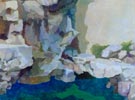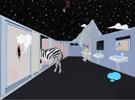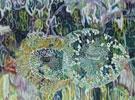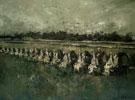A true politics implies an active shunning of the entire discursive system, reflecting instead on the conditions of possibility of the established order and its formations. For this reason, true politics actually resides in the way we confront the lived world, in the choice of whether to abide by an existing way of working, or to seek possibilities elsewhere. Without saying as much, Zhou Bin has chosen the latter.
In his recent “Thirty Day Plan,” Zhou Bin made this choice ever more clear, forcing himself to realize a new piece each day for a whole month. These thirty days were parenthetical, a return to a lived world full of potential, in which everything was unknown, and thus possible. But nothing is safe, and so in many of these works, he chose to extend upon ideas that surfaced in his earlier pieces, such as freeing his body from its customary constraints, or forcing it to complete certain actions to the point where it became uncontrollable, or using symbols to emphasize political intentions. Still, these works moved his practice another step forward, as they entailed a thorough rebuke of performativity, instead regrounding these artistic actions in lived practice, or more precisely, turning lived practice into art.
A old nail covered in paint poking out of a wall was among his subjects. Zhou Bin ground it down until the paint and rust were gone, then hammered its head into a point in a piece entitled Be Brighter, Be Sharper. This might as well have been life itself, an action performed just as easily by a thrifty carpenter in need of a new nail. But for Zhou, this action had no instrumental goal, serving only to fulfill one of many possibilities in the lived world. The nail, in effect, became a cause and a condition. And it could become a condition only because it lay within Zhou’s grasp, introducing an element of luck into the equation. The lived world, in this formulation, is one of mutually engendered chance.
Everything exists in a state of mutual dependence. The purpose of lived practice is to take charge of these connections, grasping for possibilities inside a framework determined by arbitrary conditions. Coincidence is the interplay and mutual production of potentiality and condition. For Zhou Bin, this was a new realm, particularly in his piece Walker, in which he tread across the ridge at the top of a coal mound behind his dwelling, trampling it until the mound’s pointy spine had been flattened and his task of walking became easy.
Control over predetermined action is less about success or failure than fulfilment, and fulfilment is to want for nothing. In some works, Zhou Bin seems not to have succeeded, for example the piece in which he walked around 798 at night looking for loose change on the ground but failed to find any. Still, he did not feel any lack. Coincidence and fulfilment are turns of mind, feelings of heart, and as such they displace “success” from the prime position, hinging instead on reflection. When, in the piece Safety Distance, Zhou used his finger to complete the circuit of two live wires connected to an electrical outlet, he had already accounted, intellectually and affectively, for the predetermined outcome he was about to induce, and thus he was fulfilled. The Chinese word for “thought,” xinsi, is composed of the characters for “heart” and “mind.” Seen in this light, the most radical work in the entire “Thirty Days” project was Asthma, wherein the artist, soaked in rain, suffered an asthmatic bout, in response to which he drank water, opened the window, let in the fresh air, and tried to keep warm. Can this be called a work of art?
In the end “art” as juncture can only give us a kind of condition and possibility; our attitude toward art is only ever our attitude toward life. Particularly when it comes to performance, when it stops being performative, and instead becomes a lived practice, we “cross” from the possibilities of art into the possibilities of life:
In 1996, in Lhasa, artist Zhang Shengquan attempted to realize a performance that entailed carrying a lamb in his arms across a river and then slaughtering it. After he had crossed the river, artist Song Dong physically intervened to protect the lamb, pleading with Zhang to let the lamb go. After a long deadlock, Zhang dropped his knife and let the lamb go, believing his work to have failed. Later on, Song wrote in a letter to Zhang: “I did right by the lamb, but wrong by you. I prevented an artistic action. Please forgive me. I did not want to obstruct you, but in this special place—Tibet, with its belief in reincarnation—and upon your intervention, this lamb had already been reincarnated. He was no longer a lamb to be served on a table. He had already left that life behind, and we should have let him die. This unfinished performance by the late Zhang was titled Crossing.
1, 2, Ref: Gao Minglu, “Human demon within one body: the body of Chinese contemporary art in the ritual characteristics”, Gao Minglu, “Wall: Contemporary Chinese Art History and the Border”, Chinese People's University Press, 2006, The first 161-188 pages.
3, Wen Pulin, “Da pu da zhang”, Wen Pulin Chinese avant-garde art files, 2008, p. 187.




